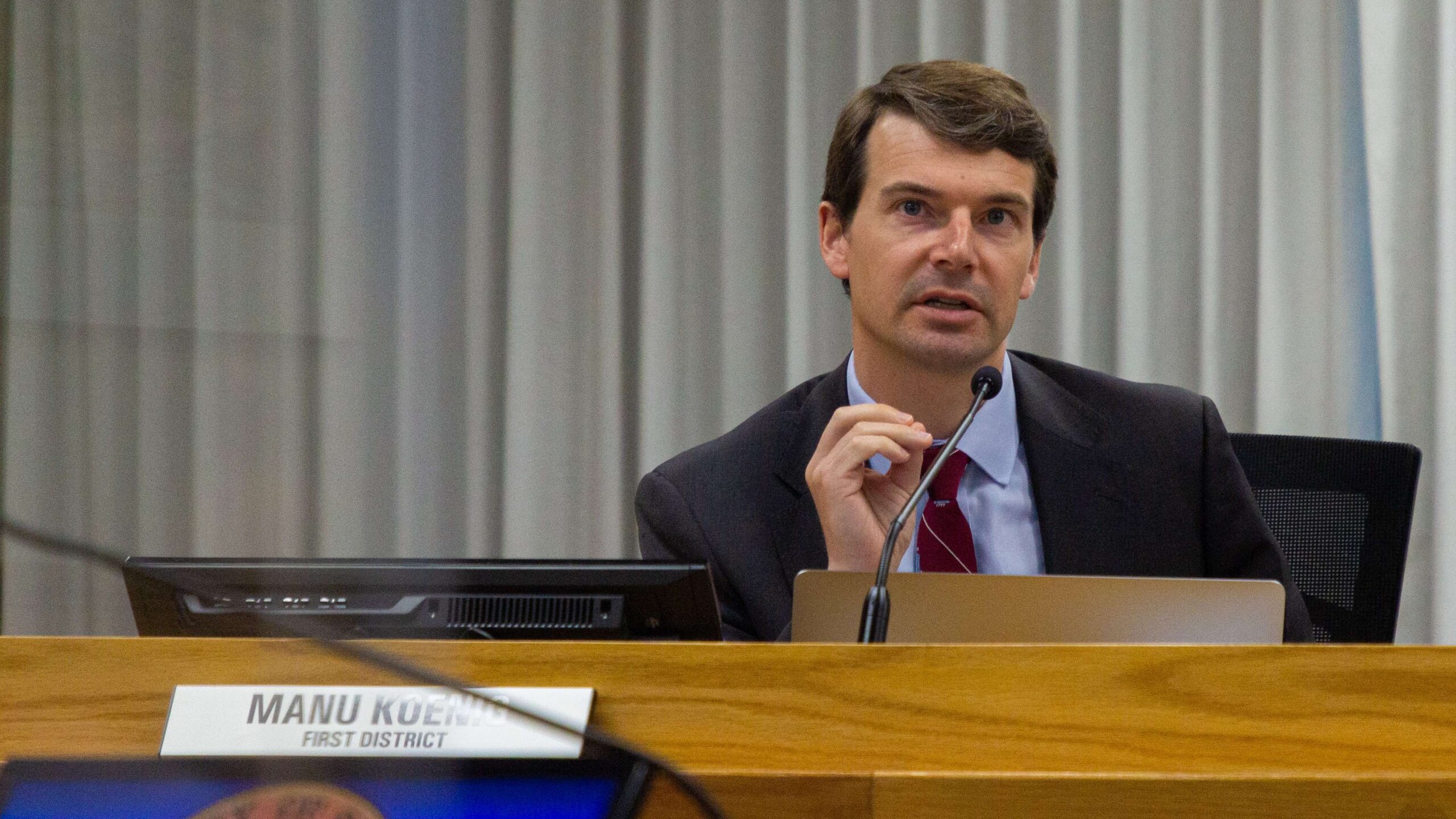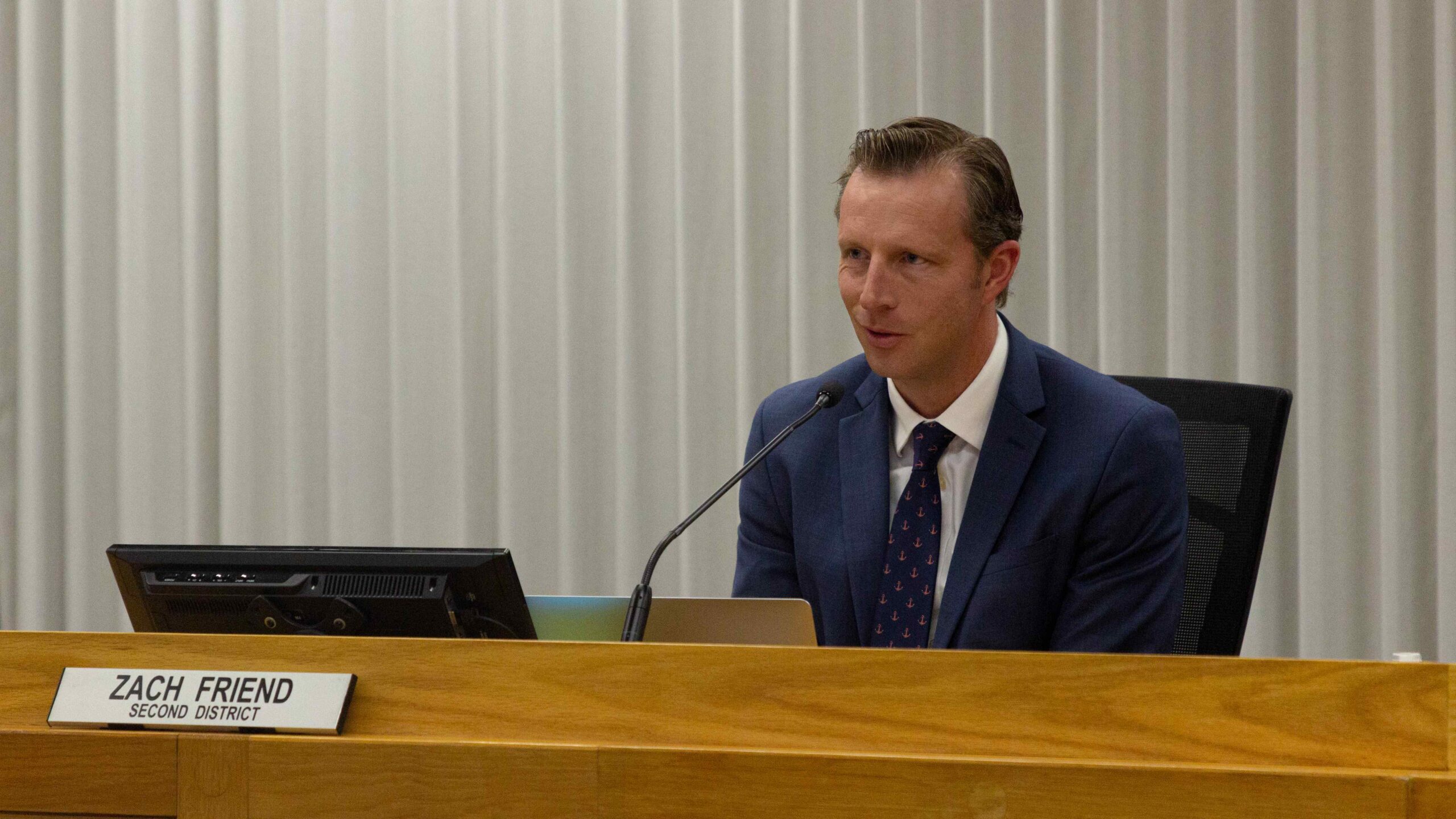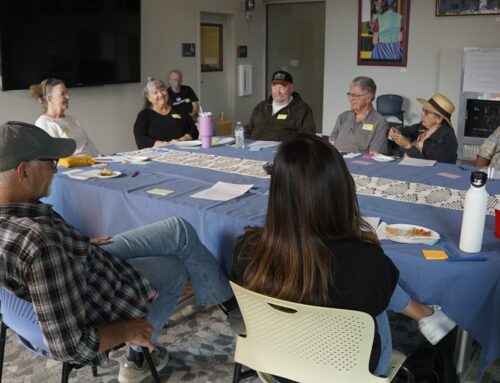
Santa Cruz County Supervisor Manu Koenig said more of the county budget should be spent on road repairs, but other supervisors did not join him. Koenig speaks during a May 14 supervisors meeting. (Marcello Hutchinson-Trujillo — Santa Cruz Local file)
SANTA CRUZ >> Santa Cruz County supervisors on Tuesday approved a budget that was 10.5% smaller than the prior fiscal year and had 16% less money for road maintenance.
The $1.2 billion budget includes more than $80 million for road repair and maintenance. That was not enough, said Santa Cruz County Supervisor Manu Koenig. Koenig voted against the budget’s approval in a 4-1 vote and urged county staff to allocate more money for roads including at the expense of other county departments.
“Ultimately, if we need to make cuts in some places, at least in order to find momentum towards a solution,” Koenig said. “I think we need to do it.”
Supervisors Justin Cummings, Bruce McPherson, Felipe Hernandez and Zach Friend voted to accept the proposed budget. The final adopted budget is expected to be considered Sept. 24, said county spokesperson Jason Hoppin.
Less money for road maintenance — including pothole repair and roadside mowing — was in part due to declining state gas tax revenue, said Matt Machado, the county director of community development and infrastructure. Although gas tax money usually funds road maintenance, most of the county’s portion has been diverted to disaster repair, said County Administrative Officer Carlos Palacios.
Money for roads
Since 2017, the county has spent about $350 million on roads, nearly half of it related to disaster response, said Palacios. The budget approved Tuesday allocates $83 million for road projects, including $11 million of the $779 million General Fund.
The county awaits $125 million in disaster reimbursements from the Federal Emergency Management Agency. FEMA is taking five to six years to offer reimbursements, Palacios said. There are 88 unfunded county road projects related to storm damage from 2023 and 2024, according to the county budget report.
The projects are not funded because they are not covered by a disaster declaration or because FEMA claims are in initial stages, the report stated. The unfunded projects represent about one-third of the 370 sites with storm damage since 2017.
Supervisors on May 18 approved up to $105 million in debt to temporarily backfill the missing reimbursements. That includes up to $95 million in Lease Revenue Bonds and up to $10 million as an internal loan from the county’s workers compensation self-insurance fund. The county may be able to pay back much of that money as FEMA reimbursements trickle in over the next five to seven years, said County Budget Manager Marcus Pimentel.
The money is set to fund:
- $65.1 million in existing repair projects related to 2022-2023 storms and the 2020 CZU Lightning Complex Fire.
- $7 million for new 2022-2023 storm repair projects.
- $4.5 million to purchase a new county building at 150 Westridge Drive in Watsonville. The county now leases the building for Health Services Agency staff.
- $12.5 million to refinance debt.
- $8.9 million to issue and maintain the bonds.
“Another government agency might have held back and stopped work and waited years and years,” Pimentel said at the May 18 meeting. “We’re taking the bold step to move forward and bring our community back to recovery— at least a good, strong partial recovery.”
Civil Grand Jury road report
The Santa Cruz County Civil Grand Jury released a report June 5 on the county’s roads that recommended bumping funding towards the county’s most degraded roads.
County Public Works staff consistently have prioritized repairs of less degraded roads, which are less expensive to complete and can prevent more costly damage, according to the report. County officials have not yet responded to the recommendations.
Koenig said the county’s budget doesn’t include enough money for roads. He suggested diverting money from the Public Defender’s Office to roads. The Public Defender’s Office is set to receive $18 million, about $1 million more than last year. The increase will go towards carrying out the state-mandated Community Assistance, Recovery and Empowerment Courts for people with severe mental illness and substance use disorders, according to a staff report.
“The public defender does great work,” Koenig said. “But the one service the majority of county residents rely on is the roads.”
Koenig added that increasing funding and staffing for the planning department would spur more development and increase the county’s property tax income. “I just don’t know how we can ensure that the county budget stays in good health going forward if we don’t uphold those property values, which drives so much of our General Fund,” he said.
Other supervisors offered a pessimistic view of the county’s financial state. Frequent climate disasters have created “a functionally unmanageable situation,” said Friend. “We’re really transitioning from an investment-based budget to a survival-based budget,” Friend said.

“We’re really transitioning from an investment-based budget to a survival-based budget,” said Santa Cruz County Supervisor Zach Friend. Friend is pictured during the supervisors’ May 14 meeting. (Marcello Hutchinson-Trujillo — Santa Cruz Local file)
Cummings agreed that climate change was driving the county’s budget. He expressed disappointment with the holdup of an anticipated $10 million from Measure K, a sales tax hike approved by county voters in March. The tax faces a legal challenge from Boulder Creek resident Bruce Holloway, who has said the entire county was not legally allowed to vote on a sales tax assessed only in the unincorporated county.
“There is money in Measure K for roads, there’s money in there for our workers, there’s money in there for fire suppression, and there’s money in there for affordable housing,” Cummings said. “We’re not going to have access to that for an indefinite amount of time.”
Several residents read a letter that urged supervisors to reallocate money for the Sheriff’s Office to social programs. Fifteen community organizations and 122 people signed the letter, said homeless advocate Reggie Meisler.
“During the budget hearings, we witnessed a narrative from board members and law enforcement that only policing and incarceration create public safety, while public health was relegated to service provision through grant chasing,” the letter read. “It is time to scale back our investment in jails as a solution to address public health needs.”
What do you think?
Read more
- ‘Bleak’ outlook for Santa Cruz County budget— April 11, 2024
- Sales tax hikes for Santa Cruz County, city win in unofficial results — March 5, 2024
- Road repair backlog mounts in Santa Cruz County — Oct. 27, 2023
- Brown, De Serpa head to November runoff for District 2 Santa Cruz County supervisor — March 5, 2024
- Property tax changes proposed in Santa Cruz County — Nov. 9, 2023
- Explainer: Property taxes in Santa Cruz County
- Election Guide, March 5, 2024: Measure K – County of Santa Cruz sales tax increase
Jesse Kathan is a staff reporter for Santa Cruz Local through the California Local News Fellowship. They hold a master's degree in science communications from UC Santa Cruz.





